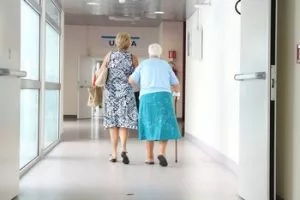
When you place your loved one in the care of trained staff at a nursing home, the last thing you think about is the possibility that your relative may succumb to a fatal infection. But that is what is happening around the country, as elderly patients in overcrowded nursing homes fall victim to severe infections–called sepsis–as a result of bedsores, according to an investigation by Kaiser Health News and The Chicago Tribune.
A federal report recently revealed that sepsis is the most common reason for transferring patients from a nursing home to a hospital, and death occurs much more often in sepsis cases than in hospitalizations for other reasons. Sadly, as many as 25,000 patients a year are transferred to hospitals suffering from sepsis, according to a report by a private health care data firm. And the statistics in Illinois are similarly bleak: every year about 6,000 nursing home residents are hospitalized for sepsis, and 1 in 5 pass away.
Sepsis is a potentially life-threatening complication of a serious infection in the bloodstream that can develop in bedridden patients. These serious infections are often the result of bedsores–also called pressure sores–that go untreated in nursing homes. Fully 60% of nursing homes in Illinois have been cited for failing to properly treat bedsores. Elderly residents, who may be in fragile health already, can have difficulty recovering from sepsis, and that is why it is so deadly.
The tragic thing about these statistics is that bedsores are entirely preventable–by turning bedridden patients every 2 hours. That, however, takes staff and time and many nursing homes are not providing this simple standard of care. To compound the problem, nursing homes are not following federally mandated infection control standards. Eighty-eight percent of Illinois nursing homes have been cited for not having or not following an infection control program. This allows small infections, which are undetected and untreated, to become big infections that kill patients.
Why is this such a big problem in Illinois nursing homes? Because Illinois has some of the lowest staffing levels for nurses and aides in the country. In the Chicago area alone, 78% of facilities have staffing levels below the national average. Much of the blame for this lies with Illinois’ severe financial woes. Illinois’ Medicaid payment rates are not only lower than most other states, but they are also slow and erratic. This is disastrous for facilities that rely on Medicaid for much of their revenue.
The nursing home industry would like to blame the problem of sepsis and bedsores on law firms who sue nursing home facilities for grieving families and use this issue as an excuse to push through tort reform. Quite frankly, this is insulting. Taking a position that nursing home patients, harmed as a result of negligence, deserve less money from the people who hurt them, is not fixing the problem. It is telling senior citizens that their lives are not worth much.
Put the blame where it belongs: with Illinois’ government and the nursing homes themselves. They need to work out a solution that involves:
· Reasonable, on-time Medicaid payments
· Background checks and improved training for employees
· Increased staffing levels
· Better oversight of care from regulators and nursing home administrators
· More transparency with regard to violations at nursing homes.
The epidemic of sepsis in Illinois needs to be addressed immediately, especially since the problem will get worse as our population ages. There is no excuse for letting senior citizens die from infections which should never happen in the first place.
Until that happens, we will continue to represent victims of nursing home negligence and abuse in their fight for justice. If you feel you or a loved one has been injured because of nursing home negligence, call our experienced nursing home abuse attorneys at 630-527-1595 for a free evaluation of your case.
http://www.chicagotribune.com/news/watchdog/ct-met-nursing-home-sepsis-deaths-20180828-story.html

"*" indicates required fields